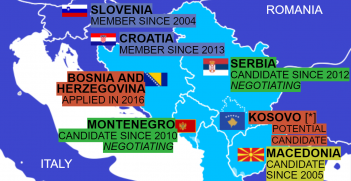Australia and the EU: Working Together for a Common Future

Today’s transnational problems cannot be solved by hiding behind borders. With their shared values, the EU and Australia must and will work together to promote freedom and prosperity.
Australia and Europe have a close relationship. This may not be true geographically, but certainly historically and of course politically, we have much in common.
We belong to the Western world. We share the same values. We also have strong economic ties. There are many people in Australia with family and historical ties to countries that are now part of the European Union. This leads to ties that are economic, certainly, but also have something ungraspable that unites them: a notion that encompasses civilisation, identity, and culture. Those bonds are even more durable than the economic ones.
The European Union was created as value-based. It was not in the first place an economic project. It was our answer to the cruelty and barbarism of World War II and all the preceding wars. The Union was based on reconciliation between nations and thus, on the restoration of human dignity, and the irreplaceable value of each human person. We renounced revenge. By dehumanising others inexorably we are dehumanising ourselves in a never-ending spiral of violence and hate. The EU stopped this fatal evolution. The fall of the Berlin Wall was also value-based. It was a victory over deceit, over dictatorship, over ignoring the uniqueness of every human being. A person was only one million divided by one million. A person was only part of the main. Joining the Union meant joining those values. But these values are not unique to the European Union. We find them in many of our closest partners and together we have to defend those values. We have to defend the idea that these values are the guarantors of freedom and prosperity. Australia and the EU belong to the Western world.
Within the European Union we know that people want us to defend their interests and keep threats at bay when it comes to global and cross-border issues. These are issues such as international tax evasion, illegal immigration, environment and climate change, cybersecurity and the threat of international terrorism. We cannot fight such threats by retreating behind our borders. We can best fight them hand-in-hand with like-minded international partners such as Australia. Because these are issues that affect Australians too. There is no place in this world for standing alone and for nationalism.
Power and influence in the world are more and more a matter of economy, and less of weapons. The global economic scramble for markets and resources is still about confrontation and competition. It is, at the risk of distorting the thought of Clausewitz, the continuation of politics by other means. In that respect, the “old play” of rivalry is still on. Yet there is one vital difference: today’s global economic interdependence. The major powers cannot achieve prosperity by undermining what is the right way to peace. The EU as a peace project is underpinned by economic interdependence.
And that is why we have to work together to deepen the good relationship we already have. The EU-Australia Leadership Forum is a good step in that direction, bringing together not just governments but our business people, media, academics and civil society. We have to deepen our relationship. An EU-Australia FTA would be a major achievement. It will of course take a lot of work and political will. In a world with new and unexpected protectionist threats the EU is ready to defend free and fair trade. I welcome the statement made by our leaders to commence work towards the launch of negotiations for an FTA. It would more than complete the EU-Australia Framework Agreement.
My last overseas engagement as President of the European Council was attending the G20 Summit in Brisbane in November 2014 and I have also travelled the country in a personal capacity while I was Prime Minister of Belgium in 2009. So I think I have a good idea of the similarities (as well as the differences) between the EU and Australia. Most of all I remain convinced of the importance for our common future of working together.
Herman Van Rompuy is President of the European Policy Centre. He is former president of the European Council and a former prime minister of Belgium.
This article originally appeared in The EU and Australia: Shared Opportunities and Common Challenges, published on the occasion of the inaugural EU-Australia Senior and Emerging Leaders’ Forums in Sydney on 2–6 June 2017. The AIIA is part of the international consortium selected to deliver the EU-Australia Leadership Forum project, a three-year initiative funded by the EU.





